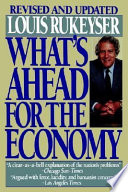

The book delves into the transformation of the workplace due to technological advancements. It discusses how automation and artificial intelligence are reshaping traditional roles, leading to the emergence of new job categories. The narrative emphasizes the importance of adaptability and continuous learning, as workers must now acquire new skills to remain relevant in this evolving landscape. The authors provide insights from various industries, showcasing successful companies that have embraced change and those that have struggled to adapt. This idea highlights the necessity for both individuals and organizations to be proactive in understanding and preparing for future work dynamics.
Continue readingWhats Ahead Econmp explores the macroeconomic trends that are influencing global markets. It examines shifts in consumer behavior, the impact of globalization, and the rise of emerging economies. The authors analyze how these factors contribute to economic volatility and the need for businesses to be agile. The book provides case studies of companies that have successfully navigated these shifts, illustrating the importance of market research and strategic planning. This idea underscores the interconnectedness of global economies and the implications for businesses operating in diverse markets.
Continue readingA significant theme in the book is the growing importance of sustainability in business practices. The authors argue that companies must prioritize environmental and social governance (ESG) to meet the expectations of consumers and investors. They discuss various strategies for integrating sustainability into business models, such as circular economy practices and ethical sourcing. The book provides examples of organizations that have successfully implemented sustainable practices, demonstrating that profitability and responsibility can coexist. This idea emphasizes the need for businesses to innovate while considering their impact on society and the environment.
Continue readingThe book highlights the critical role of technology as a driver of innovation. It discusses how advancements in artificial intelligence, blockchain, and the Internet of Things (IoT) are creating new opportunities for businesses. The authors provide insights into how companies can leverage these technologies to enhance efficiency, improve customer experiences, and develop new products. They also caution against the risks associated with rapid technological change, including cybersecurity threats and data privacy concerns. This idea encourages businesses to embrace technology while being mindful of its implications.
Continue readingWhats Ahead Econmp emphasizes the importance of cultivating an entrepreneurial mindset, not just for entrepreneurs but for all professionals. The authors argue that creativity, resilience, and a willingness to take risks are essential traits for success in today's economy. They provide practical tips for developing this mindset, such as embracing failure as a learning opportunity and fostering a culture of innovation within organizations. This idea suggests that individuals who adopt an entrepreneurial approach can better navigate challenges and seize opportunities in their careers.
Continue readingThe book addresses the complexities of globalization and its impact on businesses. It discusses the benefits of accessing new markets and diverse talent pools, but also highlights the challenges, such as cultural differences and regulatory hurdles. The authors argue that businesses must adopt a global mindset and be prepared to adapt their strategies to different regions. They provide examples of companies that have successfully expanded internationally, illustrating the importance of understanding local markets and building strong relationships. This idea underscores the need for businesses to be culturally aware and responsive in a globalized economy.
Continue readingFinally, the book underscores the significance of networking and collaboration in achieving success. The authors argue that building strong professional relationships is crucial for personal and organizational growth. They provide strategies for effective networking, such as leveraging social media and attending industry events. The book also discusses the benefits of collaboration, both within organizations and across industries. This idea highlights that success often comes from working together and sharing knowledge, rather than operating in isolation.
Continue readingThe reading time for Whats Ahead Econmp depends on the reader's pace. However, this concise book summary covers the 7 key ideas from Whats Ahead Econmp, allowing you to quickly understand the main concepts, insights, and practical applications in around 24 min.
Whats Ahead Econmp is definitely worth reading. The book covers essential topics including The Future of Work, Economic Shifts and Trends, Sustainability and Corporate Responsibility, providing practical insights and actionable advice. Whether you read the full book or our concise summary, Whats Ahead Econmp delivers valuable knowledge that can help you improve your understanding and apply these concepts in your personal or professional life.
Whats Ahead Econmp was written by Louis Rukeyser.
If you enjoyed Whats Ahead Econmp by Louis Rukeyser and want to explore similar topics or deepen your understanding, we highly recommend these related book summaries:
These books cover related themes, complementary concepts, and will help you build upon the knowledge gained from Whats Ahead Econmp. Each of these summaries provides concise insights that can further enhance your understanding and practical application of the ideas presented in Whats Ahead Econmp.